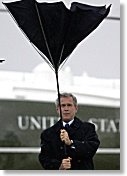
Here's a posting I contributed to the "Comment Is Free" group blog run by the Guardian newspaper....
On Wednesday, President George W Bush said, "Absolutely, we're winning" the war in Iraq. But he also remarked, "I'm not satisfied" with the situation in Iraq. He further noted, "Last spring, I thought for a period of time we'd be able to reduce our troop presence [in Iraq] early next year." Then he acknowledged that was now not going to happen. To sum up his position: the United States is succeeding in Iraq but conditions there have gotten worse. This is what an election can do to a politician: make him talk nonsense.
With congressional elections less than two weeks away and the predictions dire for Republicans, Bush is in a bind. The only national news of the moment - besides the fuss over Madonna's adoption of an African boy - concerns the Iraq war and the congressional page scandal. Neither of these two stories helps the president's party. There's not much Bush can say about the sordid page affair, as prominent house republicans - including House Speaker Denny Hastert - appear before the house ethics committee to offer private testimony about who knew what when. Iraq is another matter. That's the president's pet project - and it's the number-one drag on his party. Charlie Cook, a veteran and non-partisan analyst who tracks congressional races, estimates that the war is responsible for about 70 percent of the public's anti-Republican mood. Each day's news stories make it seem that Iraq is closer to civil war. So the White House has to try to do something-anything-to stop the bleeding from this political wound.
Yet on Iraq Bush is burdened with two conflicting aims. Because he has for years issued unduly optimistic pronouncements about developments in Iraq, in this election season he has had to confront the charge that he's detached from reality. His recent decision to drop the "stay the course" phrase from his rhetoric was an acknowledgement that he had come to be seen as inflexible and out of touch. At the same time, however, Bush has to defend his Iraq enterprise and convince an increasingly sceptical public that it has not been one gigantic blunder. What a fix to be in. Bush has to demonstrate he does recognize Iraq is a mess, but he also must be a cheerleader for that mess.
It's tough to do both at once. The White House, though, has obviously calculated that attempting the impossible (even if that means suffering the darts of pesky columnists) is better than staying mum. Karl Rove and other Republican strategists apparently were worried that public support for Bush and the war could in the next two weeks slip further than it has and further imperil Republicans in the elections. So they had Bush present conflicting messages in the hope that some undecided voters (as well as true-blue Republican supporters whom the party needs to keep enthusiastic) would hear what they want to hear from the president.
Still, the meta-dynamics of the congressional race are out of the hands of Rove and the Republicans. They cannot turn around the public attitudes about Bush and his war. Senator Bill Frist, the Republican majority leader, said on Tuesday that Republican candidates should not focus on Iraq. (In an email sent out this week, Frist claimed that Representative Nancy Pelosi, the Democrat who would become House Speaker should her party gain 15 or more seats, would "compromise 100% of our National Security.") Regarding the war, Bush at best can tread water and endeavour to prevent further slippage on this front. But his Wednesday statements are not likely to help much.
How the Republicans handle the on-the-ground mechanics in the key House and Senate races will have a greater impact on the overall outcome of the elections. The National Republican Congressional Campaign has identified 33 House races (out of 435 contests) to target. Twenty-nine of those involve a Republican incumbent. Party officials will dump money and below-the-belt negative ads into these races, praying this will be enough to protect their majority in the House. At this late stage, what Bush has to say counts for little. With the war, he's already made his point.
Posted by David Corn at October 26, 2006 12:49 PM